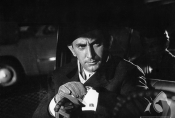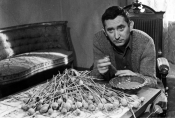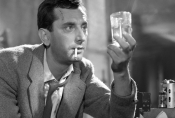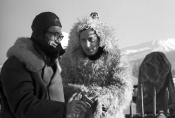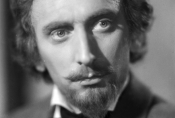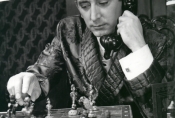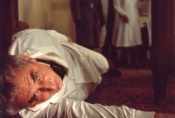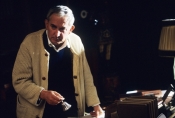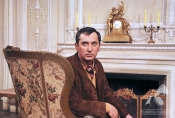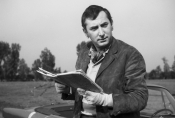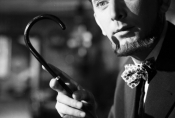Gustaw Holoubek
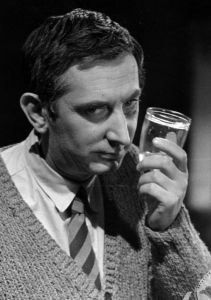
His output is impressive: over one hundred theatre productions, a hundred televised spectacles, over seventy roles in films and TV series, voice acting… He was also a director, screenwriter, teacher and socio-political activist.
He was born on April 21, 1923 in Krakow; died on March 6, 2008 in Warsaw. A graduate of the Krakow National Drama School (1947), he appeared on stage in Dramatyczny Theatre in Kraków (1946-1949), the Stanisław Wyspiański Śląski Theatre in Katowice (1949-1956), as well as theatres in Warsaw: Polski (1958-1959, 1982-1989), Dramatyczny (1959-1963, 1969-1982), Narodowy (1963-1968) and Atenaeum (1968-1969, 1989- 2006).
He debuted in film in 1953 with the role of Felix Dzerzhinsky in Żołnierz zwycięstwa/Soldier of Victory by Wanda Jakubowska. His first great performance was in Pętla/Noose (1957) by Wojciech Jerzy Has, based on the famous short story by Marek Hłaski, the poignant study of a young man addicted to alcohol. We see one day of his life, which was to be a breakthrough for the protagonist, but which proves to be his last. After this debut, he immediately became Has' favourite actor, as evidenced by his fantastic performances as Mirek, the nephew of Countess Rose, Pożegnania/Farewells (1958), “Dziadzia” in Wspólny pokój/Common Room (1959), the lawyer Oskar Rennert in Rozstanie/The Parting (1960), the mathematician Don Pedro Velasquez in Rękopis znaleziony w Saragossie/The Manuscript Found in Saragossa (1964), Dr. Gotard in Sanatorium pod klepsydrą/The Hourglass Sanatorium (1973), the professor in Nieciekawa historia/Uninteresting History (1982), or the judge in Pismak/Hack Writer (1984).
Holoubek was also highly praised by Tadeusz Konwicki, who cast him as the host in Salto (1965), a grotesque story dedicated to “us ourselves” – as Zbigniew Cybulski, who played the main character in the film, succinctly put it. Salto was intended as a challenge to the achievements of the Polish Film School, and the final scene is reminiscent of the famous dance in Wajda’s version of Wesele/Wedding by Wyspiański. In Jak daleko stąd, jak blisko/ How Far, And Yet How Close (1971), an unforgettable story of soul-searching, where truth is mixed with dreams and reality with phantasmagoria; he played Maks, a young man who commits suicide, while in Lawa/Lava (1989), loosely based on Mickiewicz’s Dziady/Forefathers' Eve – Hermit-Gustav, the Spectre, Gustav-Konrad, and the Poet. Konwicki and Holoubek’s artistic collaboration and friendship became the focus of a documentary by Jan Holoubek, the actor’s son – Słońce i cień/Sun and Shadow (2007).
The actor also played very interesting roles in popular cinema, for example as Veit Stoss (Wit Stwosz) in the adaptation of the children’s novel by Antonina Domanska – Historia żółtej ciżemki /The Story of the Golden Boot (1961), adapted by Sylwester Chęciński. He also played a former concentration camp prisoner who tries to bring order to a town in the post-war “recovered lands” in the quasi-western Prawo i pięść/ The Law And The Fist (1964) by Jerzy Hoffman and Edward Skórzewski, or the title character in Leonard Buczkowski’s comedy Marysia i Napoleon/Maria and Napoleon (1966). His specialty, however, was more psychologically complex roles, such as the husband in the New Wave film Gra/The Game (1968) by Jerzy Kawalerowicz, the professor in Zygfryd (1986) by Andrzej Domalik – a beautiful adaptation of Iwaszskiewicz’s subtle short story, the patient of a sanatorium for the elderly and chronically ill in the moving Księga wielkich życzeń/The Book of Great Wishes (1997) by Sławomir Kryński.
In 2005, Tadeusz Pikulski made a feature-length documentary about Holoubek, Gustav Rex, and in 2010 Piotr Łopuszański wrote a book about him, Gustaw Holoubek. Filozof bycia/Gustaw Holoubek. A Philosopher of Being.
Jerzy Armata
Selected filmography
-
1957
NOOSE
reż. Wojciech Jerzy Has
-
1958
FAREWELLS
reż. Wojciech Jerzy Has
-
1964
THE MANUSCRIPT FOUND IN SARAGOSSA
reż. Wojciech Jerzy Has
-
1965
SALTO
reż. Tadeusz Konwicki
-
1971
HOW FAR FROM HERE, AND YET HOW CLOSE
reż. Tadeusz Konwicki
-
1973
THE HOURGLASS SANATORIUM
reż. Wojciech Jerzy Has
-
1978
HOSPITAL OF TRANSFIGURATION
reż. Edward Żebrowski
-
1986
ZYGFRYD
reż. Andrzej Domalik
